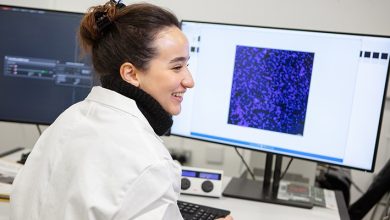Novel blood test identifies biomarkers in patients with Alzheimer’s Disease

Early results from PharmaKure, a pharmaceutical company spun out from The University of Manchester, shows a novel whole blood test developed by the company is able to quantify Alzheimer’s Disease biomarkers. PharmaKure’s proprietary ALZmetrixTM blood test can, they find, identify blood-based biomarkers in patients with Alzheimer’s Disease to provide early warning of cognitive decline. The company will undertake a larger study in which an independent laboratory will be used to validate the results before obtaining regulatory clearance for rolling out the test.
The ethics approved clinical trial, carried out in a blinded study was designed to focus on the testing of whole blood. A number of biomarkers were accessed for the stratification of Alzheimer’s subjects who had previously been tested for amyloid deposits, using either brain PET imaging or cerebrospinal fluid (CSF). Levels of biomarker proteins were measured in blood from patients at the earliest stages of Alzheimer’s Disease. The study investigated whether it is possible to accurately determine whether a patient had amyloid deposits in their brains, as well as predicting how far they had progressed along the path towards full Alzheimer’s Disease. A simple blood test such as ALZmetrix may offer an accurate and simple alternative to costly and unpleasant PET brain imaging or collection of CSF.
Blood from 54 subjects at the Glasgow Memory Clinic (Neuroclin; Motherwell, UK) was shipped to PharmaKure (Manchester, UK) for analysis. Key biomarker proteins associated with Alzheimer’s Disease pathology are amyloid-β (Total, Aβ40 and Aβ42), α-synuclein and Tau (Total, pTAU(181) and pTAU(217)). The study evaluated the relationship of aggregated forms of these proteins in patient blood, compared to PET scans and CSF findings. Machine learning tools were used to combine the blood biomarker and patient data (age; gender; amyloid status; ApoE4 genetics) in an optimal way to develop predictors.
The study’s results confirm that using whole blood, rather than just the blood plasma fraction, can identify people who are at high risk of developing full-blown Alzheimer’s disease. In addition, the machine learning software shows which biomarkers are most useful for this purpose.
“We are particularly pleased to find that our ALZmetrix blood test can differentiate between patient groups that are amyloid positive or amyloid negative with 97% accuracy to predict those at highest risk of Alzheimer’s Disease,” said Professor Andrew Doig, Head of R&D at PharmaKure and researcher at The University of Manchester. “Age, APOE4 and pTau are the most useful features in the prediction. We have also shown that blood can track disease progression, primarily using levels of Tau and pTau.”
“These results represent an important step in developing whole blood tests to address a major unmet need for an alternative to PET and CSF scans”, said Dr Farid Khan, CEO at PharmaKure Limited. “This study has demonstrated how to get early warning signs of cognitive decline using whole blood. We will be using the exciting data to expand our ALZmetrix test to additional patients and new biomarkers.”
“Using the ALZmetrix test for Alzheimer’s could provide a low cost, easily accessible test for stratifying patients for clinical studies, as an alternative to expensive brain scans or other plasma-based tests,” said Dr Bob Smith, Clinical Director at PharmaKure.
One of the key advantages of using whole blood is that it may enable the development of a screening system to catch Alzheimer’s before any major memory problems become apparent. This would allow treatments to be offered earlier, thus providing better population-based health outcomes, lowering health system costs and improving the quality of life of millions of patients.
Though the scientific team will be publishing the results a journal in the next few months, they feel it is in the public interest to disseminate the result as soon as possible as there are no tests available to diagnose the early stages of the disease.




